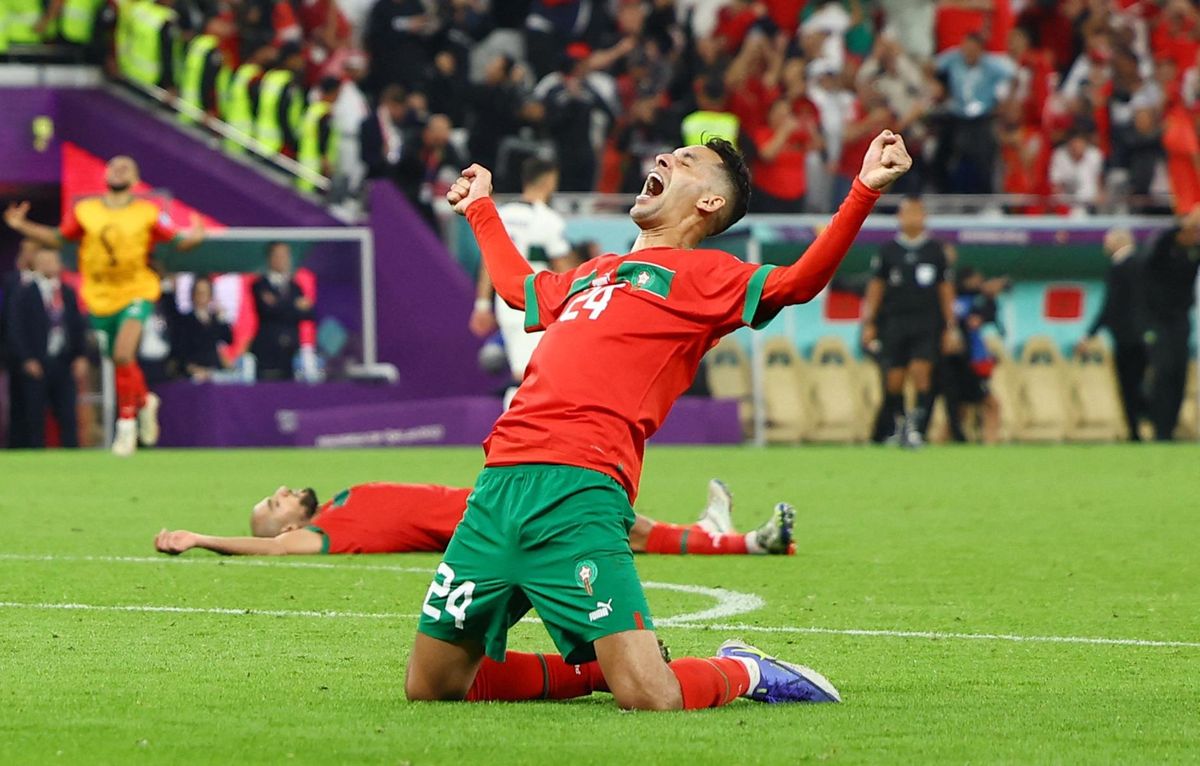Eurasia Group's Strahinja Matejic is attending the Atlantic Dialogues conference in Marrakech, Morocco. But he decided to go a day early to join local fans who watched the Atlas Lions make World Cup history.
“Are we winning tonight?”
That was the first question a Moroccan immigration officer asked me at the Casablanca airport just hours before Morocco faced mighty Portugal in the quarter-finals of the men's soccer World Cup in Qatar.
Casablanca, the country’s bustling largest city, had ground to a halt by the time the teams were warming up. Bus drivers, roller skate hawkers in the Arab League Park, street vendors … all quickly found a chair or at least a wall to lean on. Everyone was at a watch party.
In a packed café near the King Hassan II Mosque, I gestured like a coach asking the ref for a free kick to procure a small plastic ottoman to sit on. When they realized I was a guest in Morocco — and supported their jeering of Cristiano Ronaldo, Portugal’s past-his-prime GOAT — a group of students invited me to join them and promoted me to a full chair.
Leading the chants at the table is one of my new friends: Aarifa, from Sudan. She's in Morocco on an international scholarship — one of many ways the government is investing in its soft power.
That's also the primary reason I'm there, as I explained to the immigration officer after agreeing that yes, of course, Morocco will advance. I'm attending the Atlantic Dialogues conference in Marrakech, one of several policymaking events Morocco is hosting in the next few weeks for organizations like the African Union in Tangiers or the Alliance of Civilizations in Fez.
After Youssef En-Nesyri scored what would be the winning goal, I became part of the euphoric celebration. I hugged Naim, another member of the table, who took off his taqiyah (Muslim skullcap) embroidered with the Moroccan flag and put it on my head. As we awaited the final whistle in a thick cloud of cigarette smoke, the Atlas Lions supporters in Casablanca were roaring as loud as those lucky enough to be cheering inside the Al Thumama Stadium in Qatar.
When it was all over, everyone stormed the streets. Bikes, cars, even food trucks full of fans in a frenzy waved flags of Morocco, the Arab League, and Palestine to mark the first time an African and an Arab team had reached the semi-finals at the World Cup.
An elderly woman in a wheelchair “told” me the the moment felt to her like 1956, when Morocco became fully independent from France. Meanwhile, I saw two military service members celebrating on the roof of the Royal Naval School.
It’s almost an axiom that success in sports boosts national unity and pride. But in Morocco, that transcends national borders — both real and imagined.
This victory converges with the goal of the conferences in Fez, Marrakech, and Tangiers: to show that Morocco — whose national soccer jerseys don’t have stars above the association crest like Brazil’s or Spain’s — may not have won a World Cup (yet) but it plays an active role in the global map.
Indeed, Morocco’s historic run truly echoes FIFA President Gianni Infantino’s famous but insufficient attempt to push back against critics of Qatar hosting the tournament. Morocco now plays for all Africans, for all Arabs, for all Muslims, for all underdogs — and for all of us who romantically believe in the Beautiful Game and cherish the virtues of the sport.
When I woke up at dawn, the city was silent. The Atlas Lions were resting before the Wednesday game with the Gallic roosters. If you ask me then if “we” are winning tonight , I’ll reply the same — inshallah.





